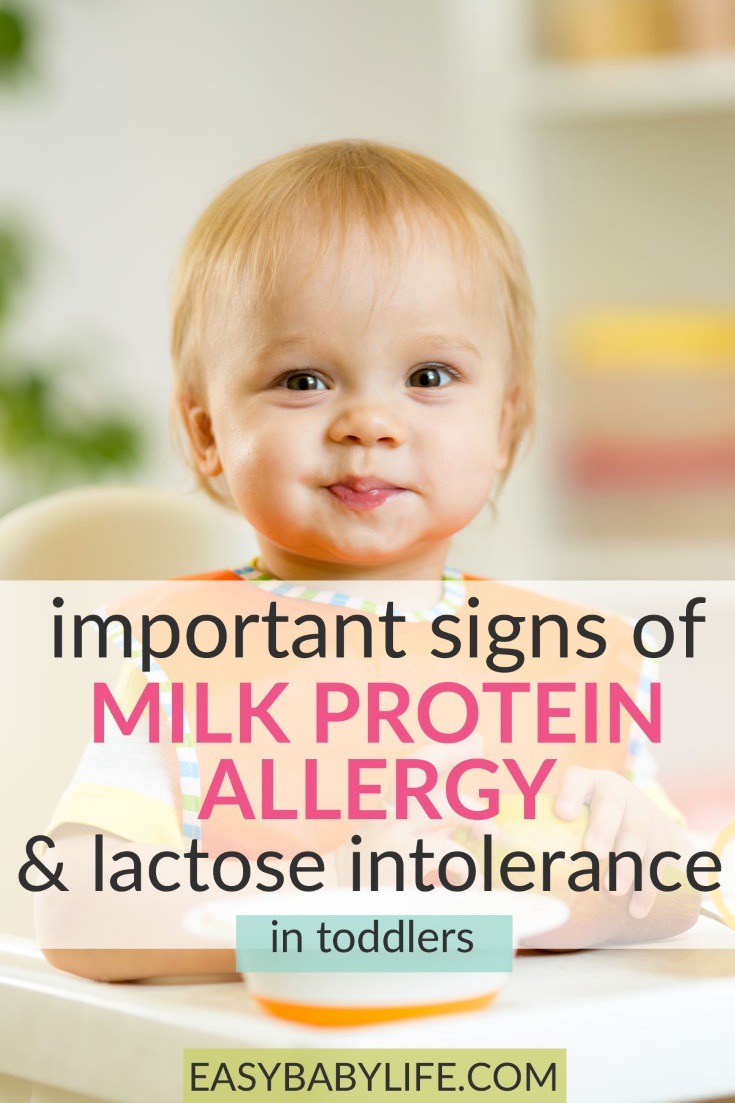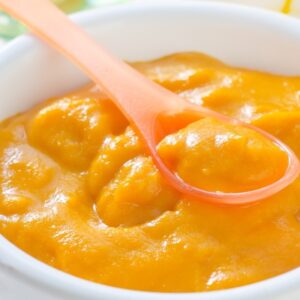What is the difference between milk protein allergy and lactose intolerance in toddlers and babies?
This is a common question to wonder about as parents of a baby or toddler. Let’s look at these two situations and other conditions that may mimic lactose intolerance or milk protein allergy.

Mom’s Question:
Could you explain the difference between milk protein allergy and lactose intolerance in toddlers?
My daughter is almost 15 months old. She has been off of formula for a few months. I have switched her to 2% milk, and she seemed okay for a while, but now she throws up curdled milk (very chunky) every morning; sorry for being so graphic!
It smells awful; her stools also smell awful but are very hard, sometimes like little tiny pellets, but a lot of them.
Are these signs of milk protein allergy or lactose intolerance in toddlers?
Everything that I have read about milk allergies talks about diarrhea, not constipation, and lactose intolerance, says hives and vomiting, etc.
I have noticed her cheeks have been very red lately, and she does have thrush.
Should I give her some kind of lactose-free milk? Or stay away completely? If so, what should I give her? She loves her bottle at bedtime and even sleeps with it next to her. She always has some milk, goes to bed, and then throws up on the way to daycare in the morning.
Just frustrated, and any help would be appreciated!!!
Signs Of Milk Protein Allergy and Lactose Intolerance In Toddlers and Babies
After the first birthday, many parents begin to transition their toddler from either breastfeeding or taking infant formula. Per the recommendations of the American Academy of Pediatrics, most physicians advise giving toddlers whole cow’s milk. The reason is that milk is a good source of calcium, protein, and vitamins A and D. Whole milk is recommended because the higher fat content is beneficial for brain development.
There are situations, however, where cow’s milk is not well tolerated. It does sound to me, too, as if your daughter disagrees with the cow’s milk. It is true that diarrhea is a more common symptom of milk protein allergy than constipation, but hard stools are a symptom too.
In this article…
Cow’s Milk Protein Allergy (CMPA) – Symptoms, Causes, Different Types
A child with this type of allergy experiences a reaction to the proteins in cow’s milk (whey, casein). This condition is seen in two to three percent of children under the age of three. Most allergic reactions occur due to a specific antibody called IgE. CMPA, however, can result from both IgE- and non-IgE-related activity. These conditions are diagnosed based on symptoms and by ruling out other possible causes. Blood and skin tests may provide additional information after 12 months of age, but a milk ingestion challenge is the gold standard test.
CMPA can be hereditary, especially when there is a family history of food allergies, eczema, or asthma.
Non-IgE Type
This form of CMPA usually begins in early infancy. The exposure occurs from cow’s milk in either infant formula or maternal breast milk. A classic scenario is a three-week-old who persistently cries, is difficult to console, and develops streaks of blood mixed in the stools. This blood is due to the irritation that cow’s milk protein causes in the intestines.
Despite frequent feedings, these infants fail to gain adequate weight. Vomiting may ensue, which leads to dehydration. By three to four months old, the dry, itchy skin patches of eczema develop from the continued milk protein exposure.
Another less common version is food protein-induced enterocolitis (FPIES). This can develop as young as 4 weeks old or later in life after years of exposure to cow’s milk. In these cases, severe inflammation of the esophagus develops, causing vomiting, diarrhea, and possible esophageal stricture. Episodes can be associated with lethargy and appear life-threatening.
IgE Type
This type of reaction to milk protein is rather immediate within a few minutes of ingestion. Red, raised hives develop on various locations of the body. The lips, eyelids, or whole face may be swelling, along with coughing or difficulty breathing. Vomiting and diarrhea may also occur. These symptoms can be potentially life-threatening, and immediate medical attention is necessary.
Lactose Intolerance – Symptoms and Causes
Unlike CMPA, lactose intolerance refers to the inability to digest the naturally occurring sugar in cow’s milk. Most infants are born with an intestinal enzyme called lactase, which can break down lactose.
A variety of situations result in low levels of this enzyme. Infants born prior to 34 weeks gestation have insufficient lactase until their intestines mature. During episodes of infectious diarrhea, toddlers can become temporarily lactose intolerant. Full lactase function resumes one to two months after the diarrhea resolves. Children with celiac disease and other conditions associated with intestinal inflammation can experience more chronic lactose intolerance.
Aside from a rare genetic condition seen among infants in Finland and western Russia, normal full-term infants are fully capable of digesting lactose. True lactose intolerance does not develop until age five. Once it does, it persists through adulthood.
Symptoms of lactose intolerance
Symptoms of lactose intolerance become evident 30 minutes to two hours after consuming cow’s milk. Complaints of a stomach ache or feeling gassy are common. Loose stools or watery diarrhea may occur depending on how much cow’s milk is consumed.
Most cases are diagnosed by recording what food was eaten before the onset of symptoms. Some medical centers have the ability to do a test that is specific for lactose intolerance, called a breath hydrogen test. In severe cases, an endoscopy may be necessary to confirm this diagnosis and rule out other etiologies of the symptoms.
Is it Milk Protein Allergy or Lactose Intolerance?
This is a good question since the symptoms are often very similar. However, here are some clues to narrow down what is going on:
- Symptoms of lactose intolerance rarely develop in people younger than 6 years of age. Before this age, milk problems are more frequent due to milk-protein allergy.
- Typically, babies younger than 6 months with milk-protein allergy develop diarrhea and eventually vomiting after several weeks of being fed with formula. If you think back, did your baby have any of these problems earlier?
- The baby gets rashes after consuming milk. It is hard for me to say if your daughter’s red cheeks are in any way related to her milk consumption, but they could be. Rashes after milk consumption are associated with milk protein allergy, not lactose intolerance.
Conditions that Mimic CMPA and Lactose intolerance
In young infants, the crying and discomfort of CMPA can mimic infantile colic. The latter, however, is never associated with weight loss or blood in the stools. Colic also self-resolves by three months old.
Bacterial intestinal infections can cause bloody diarrhea in toddlers (i.e., salmonella, E. coli). In such cases, there is often a history of a community outbreak or improper food handling. The diarrhea is associated with fever and body aches and only lasts a few weeks. Intermittent bleeding and abdominal pain can also indicate a bowel obstruction that warrants immediate medical intervention.
Constipation is the most common cause of stomach aches in toddlers when no other symptoms are present. Inconsistent eating habits and efforts to toilet train contribute to this problem. Hard stools, distention of the belly, and the passage of foul-smelling gas are common. However, constipation differs from lactose intolerance and CMPA because the child otherwise appears and behaves normally.
Treatment Options
Many infants with non-IgE CMPA outgrow it by their first birthday, but those with the IgE type may not. For toddlers who remain symptomatic, the best way to prevent an allergic reaction to cow’s milk protein is strict avoidance.
Further exposure only prolongs the symptoms and increases the risk of more severe reactions.
The American Academy of Pediatrics recommends soy milk as a suitable alternative to cow’s milk. This is because soy milk is higher in fat than other options. Some kids with the IgE-type of CMPA are also allergic to soy protein. If so, other options should be discussed with a doctor. Most of the currently available toddler formulas are cow’s milk-based and, therefore, inappropriate. New to the market, U.S. health authorities have not fully reviewed vegan toddler formulas.
For children who are lactose intolerant, lactose-free milk is available. The lactase enzyme needed to digest this sugar has been added. Strict avoidance of cow’s milk is usually unnecessary, and few symptoms may be noticed when only small amounts are consumed. Some yogurts and hard cheeses are low in lactose and may be well tolerated. A chewable lactase enzyme replacement may be appropriate for older toddlers to take when consuming such foods.
Pea Milk, Oat Milk, and Nut-based Milks
The grocery store shelves of cow’s milk now share space with various milk alternatives. The American Academy of Pediatrics has not embraced these options as strongly as the general public. Their position is that non-soy, plant-based milks are nutritionally inferior to soy versions.
Taking a closer look at the products’ ingredients, there is some validity to their opinion. Yellow split peas are used in the processing of pea milks. Although high in dietary fiber, peas are not a complete source of protein. They contain iron and calcium but lack many essential minerals. Oats are also high in fiber, but their protein is also problematic. Oat milk protein is more difficult to digest due to alterations that occur during the manufacturing process.
In their raw form, nuts are a nutrient-dense food that can be a good source of protein, healthy fats, and some vitamins. Unfortunately, most nut milks are processed in a way that the final product is quite low in protein. Although fortified with calcium, some versions lack vitamin D supplementation.
Do not give your baby rice milk (read about why here).
Advice for Parents
If your toddler seems to have difficulty tolerating cow’s milk, the first thing to do is assess the reactions. If there is immediate vomiting followed by a rash, swelling, and difficulty breathing, you should seek emergent medical care. Any blood that is noticed in the stools also warrants prompt evaluation.
If the symptoms are less severe but still troubling, a discussion with a doctor can help determine the cause and plan an appropriate solution.
I hope this helps,
Paula
More On Babies and Toddlers With Milk Problems
- Yellow Stools Due To Cow’s Milk Allergy?
- You can read more about milk allergy at MayoClinic. (Opens in new window)

Research References
- Lactose intolerance and gastrointestinal cow’s milk allergy in infants and children – common misconceptions revisited
- Milk Allergy
- Cow’s Milk Allergy in Children
- Guidelines for the diagnosis and management of cow’s milk protein allergy in infants
- Food protein induced enterocolitis syndrome (FPIES)
- Lactose Intolerance in Children
- Pediatric Gastrointestinal Bleeding Clinical Presentation
- Cross-Reactivity Between the Soybean Protein P34 and Bovine Caseins
- Cow’s Milk Alternatives: Parent FAQs
- 4 groups issue consensus report on healthy beverages for 0- to 5-year-olds
- The Appeal of Pea Protein
- Oat milk and other alternatives
- Health Benefits of Nut Consumption
Now, over to you! Share your experiences of milk protein allergy or lactose intolerance in toddlers or babies!

Paula Dennholt founded Easy Baby Life in 2006 and has been a passionate parenting and pregnancy writer since then. Her parenting approach and writing are based on studies in cognitive-behavioral models and therapy for children and her experience as a mother and stepmother. Life as a parent has convinced her of how crucial it is to put relationships before rules. She strongly believes in positive parenting and a science-based approach.
Paula cooperates with a team of pediatricians who assist in reviewing and writing articles.






I am not sure if my 3-month-old is lactose intolerant or has milk protein allergy. All I know is for the first month and a half I breastfed and supplemented with milk-based formula. I cried with my baby every night and all day because he would cry and cramp up. I went to 2 doctors and they told me it was colic and nothing I could do.
Finally, one doctor put it together, he had a massive rash on his face, he was crying all the time, cramping up after eating, and had diarrhea. I started him on Soy formula, not knowing all the downfalls to it, but it worked. Everything cleared up in ONE DAY! yes! ONE DAY! It was a new baby.
I am not sure if my baby is lactose intolerant or if he has a milk allergy, and I do not like the smell or the taste for my baby of the hypoallergic formula, smells like pure medicine. Is there a lactose-free formula out there that might be good? Again I am not sure if he is lactose intolerant or allergic to cow milk protein. How will I be able to know which it is?
And is there a few different formulas out here best to try? My dr recommended Enfamil Lactose free, but I can not find that it stores, and buying online is not for me when it comes to formula. Thank you!
First of all, kudos for not giving up, but continuing to seek second opinions to get a proper diagnosis for your baby. Absolutely wonderful that the symptoms disappeared as soon as you switched to soy formula!
I do understand the difficulties with knowing if your baby has a milk protein allergy or is lactose intolerant. Check the symptoms described in this article.
Due to the rash, it does sound more like milk allergy, but you mentioned that your pediatrician suggested Enfamil Lactose Free. Therefore, it seems to me that your doctor does not believe that your baby has a milk protein allergy. As it is important for you to know which it is, I do think you should head back to the Doctor’s office and ask for clarification and testing. As far as I know, there isn’t one single lab test to check for milk allergy, but it can be done.
The only way to prevent the symptoms of milk-protein allergy is eliminating cow’s milk from the diet of your baby. If your baby does not have lactose intolerance, breastfeeding is the first option.
If your baby cannot be breastfed, you can use complete milk protein hydrolysate or amino-acid based formulas. Partially hydrolysate formulas should not be used in children with milk protein allergy. Many babies that are allergic to cow’s milk-protein will develop soy protein intolerance if they are fed with soy-based formulas. For that reason, soy-based formulas are usually not recommended for children with milk-protein allergy – although it does seem to work well for your baby.
I hope this helps,
Paula
DO NOT GIVE UP..! When my son was born he had a milk and soy protein allergy… There was only 1 type of formula that was available for him during this time. Since I wasn’t crazy about the thought of formula I basically went on strike… I cut out all milk and soy protein out of my diet and breastfed my son… YES, IT WAS VERY HARD, but I wanted the best for him. I alternated this formula when he was almost a year old and after he turned 14 months, we introduced whole milk. He eventually outgrew the milk and protein allergy but I chose to stick with Soy and Almond milk for most of his diet. SO, again don’t give up… Your baby is worth every sacrifice you have to make… Good luck
My son is 18 months now and just got ear tubes. Ever since he turned one and got on whole milk he has been sick.
Symptoms included vomiting curdled milk, fussiness, runny nose, sneezing, redness around his eyes, constant ear infections, hard pellet-like poop then switches to diarrhea. He screams ALL THE TIME!!
He used to be a lil fatty and ate all the time, but since whole milk, I would be lucky to get him to eat anything. Even after getting the ear tubes 3 weeks ago, the symptoms are still here. He has to have food allergies.
The doc kept telling me it is from his ear infections or he has the bug, but I don’t think so at all. The ear surgeon even told me his vomiting like that has nothing to do with the ear infection.
I found on the internet a site called foodallergysolutions.com and it shows that most ear infections with continuous symptoms are caused by milk allergies. I hope this helps. I plan on taking him back to his doc tomorrow than to an allergy doc. Just so you know I know exactly what you are going through.
I hate the constant throwing up curdled milk (STINKS) constant laundry, baths, and carpet stain remover…oh yeah frebreeze too. The constant screaming and hyperactiveness. He will seem fine most of the day then
BAM pukes, runny nose, congested with a cough…he gets me so confused sometimes. ugh…
Just a couple months ago my son was diagnosed with mastocystosis, (too many mast cells in his body, pushing out the histamine which leaves bruise-like marks all over his body). He has had these marks
since he was 1 1/2 months old and is now 14 months and we are just finding out about this.
He has always been a puky baby we just dealt with it, diarrhea off and on, cough all the time. We now have
been told this is from his mast problem. He is now on allergy med to help, all confused as to how. But trying it.
For the last 10 days he has been coughing so much that he pukes up white curdled milk, so now
I’m wondering if he is allergic to milk, but he does not go for his allergy test til Oct 2019. Should I try and put him on soya or lactose milk, or is it just all his mast problem?
I am so sorry to hear about your baby’s illness. Throwing up curdled milk is, however, not in itself a sign of milk allergy. Milk becomes curdled when it reacts with stomach acid, so it is nothing strange that it is curdled when your son vomits. However, can be a sign of milk allergy, although most often together with other symptoms as specified above.
If I were you, I’d discuss your concern with your son’s doctors, to see if they think you should try to change his diet in anyway.
Good luck,
Paula
Both of my kids have had reflux/colic. I don’t
really know cause it’s so hard to get help. My son – just gone one has
been on lactose free formula for most of his life and now that he is one
he needs a different milk…… solution, lactose free milk from the
supermarket……. you would think that would be ok- but no way – I swapped
him slowly by mixing them together and then eventually to just the milk
and no formula but he has the runs, his stomach swells, he spews curdled
milk and he screams!!!!
They did a test and said he is not lactose intolerant so what is he? any ideas or experiences would be a great help!!!!
My granddaughter is on soymilk because whole milk made her sick. Throwing up. Now she is on soymilk and is having a hard time pooping. She has to see a gastrointestinal Dr
My grand-daughter could not digest infant milk
of any type, her tummy would get huge and wouldn’t have bowel movement
for a while – when she did it was hard. So, after trying different infant
formulas at 8 months, we switch to soy milk and she has done well with
the milk.
The doctors have asked us to switch to fresh milk – we tried
and she went back to having the same problem. Therefore, we stayed with
soy milk and she is now two an half.
It could be and sounds as if your toddler may
have a milk allergy, all three of mine had the same issues, I had to
give them Lactaid milk, as even soy milk would not work for them. The
hard white stools is an indication that he or she is not digesting his
or her milk properly. I would try soy milk for a few days if you do not
see an improvement in a week to two weeks then switch to Lactaid milk.
Lactaid milk has the hard to digest milk protein removed from it. I had
to have all three of mine on this for a year, after which I was able to
move to soy milk for a year and have just now at age 4 gotten them to
where they can digest 1% milk. As always consult your dr before making
any changes.
My name is Rita Ruby. i live in Australia, and am married for 15years without conceiving or getting pregnant until the issue resolved to problem in my home, i was really worried and bothered because i don’t want to loose my husband to another woman. i have went to hospital, the doctor told me that i cant get pregnant again i thought i have lost my husband and my marriage already.i decided to check the internet for updates on healthy living and i came across a story of a man of God who PROPHET JEREMIAH Trust helped his wife(Garry Linder) to conceive a baby. i decided to put a try because this has been my greatest problem in life.i contacted PROPHET Jeremiah. Trust via email and tell him my problem and he assured me that he will help me, he told me what to do which i did and today i am a proud mom with a son and daughter. Words will not be enough to explained what this man did for me.i know there is someone in this same condition and you feel there is no way. i urge you to contact prophet Jeremiah so that him can payer for you .Tust now i have giving birth to twins a boy and a girl. and my husband now love me more than before. if you are in need to get pregnant or you need your xe back or you want to win lottery, contact him through his via email [email protected] or watch him television marcylandtv com or +2347055176615 .
Hi Kylie, this could be due to a number of reasons. Acid reflux or milk protein allergy are two possibilities. Simply feeding to quickly is another one. What formula are you giving her now? If you haven’t, try switching to a hydrolysate formula or a soy-based one. (Just be aware that quite a few babies that are allergic to milk protein are also sensitive to soy protein.) (But far from all.)
If it is reflux, she should improve with more frequent smaller feedings. You can also check if the nipple hole is too large. Here is a post with a baby having similar issues: https://www.easybabylife.com/6-weeks-old-baby-throws-up.html
For symptoms of milk allergy, check this post: https://www.easybabylife.com/lactose-intolerant-or-milk-allergy.html
The fact that your baby screams when passing stools doesn’t have to be a serious issue. Many babies are uncomfortable during their first few months of living because their intestines are immature. And the formula is tougher on the baby’s tummy than breast milk. Green stools can also be normal – associated with iron-fortified formula, for example.
There are also other conditions than feeding to fast, reflux, or milk allergy that could result in a baby vomiting. In this post, you can read about more uncommon reasons, such as pyloric stenosis (narrowing of the opening from the stomach to the intestines), and laryngomalacia (underdeveloped throat/larynx muscles). https://www.easybabylife.com/3-month-old-wont-stop-throwing-up.html
If you are truly worried about your daughter’s vomiting and it doesn’t stop, and especially if she is not gaining weight, go see another doctor!
Good luck! Paula
My son is 14 months old and he started drinking while milk about 3 weeks ago and at first he was fi e but the last week he has been crying when he poops and it’s hard round poop and it’s a light yellow color he has thrown up a few times curdled milk, but not everytime he drinks it and he won’t eat anything the last 4 days not even cherrios. Could he be lactose intolerant or have a milk allergy? Please help
Hi Christy,
If the only change you’ve done to his diet is introducing milk then yes, it might very well be that he can’t deal with it. Does he get any kind of rashes too? I’d take away the milk completely for a while and see if it helps. Please post back and let us know!
My daughter is a 1.5 yrs old. She was on formula as an infant and at 8 month old we tried her on while milk and she would throw up. So we put her on 2% milk and she has been fine. Until about a week ago. She started throwing up. And we thought it was a cold or virus. So we took her to her pediatrician. They told us it was a cold but she was not running a fever. And she didn’t act sick. So we got to researching and realised that she was throwing up after drink milk. Well first we thought the milk was bad but we had just bought it a day before she started showing symptoms. Now my question. Is could she have a milk allergy after not having any symptoms or problems before? We know her stomach can’t handle the whole milk. But could she develop a milk allergy this late? She is fine eating cheese and yogurt and other dairy products but seems to be throwing up after drinking milk. She has also been having round hard rabbit stools. Any help would be appreciated.
My 4 month has been on formula since she has been about 10 weeks old – basically since going back to work. She never had an issue w/ formula before, but recently got a stomach virus which caused green, frothy diarrhea w/ white curds in poop. It has been about 2 weeks since and her bowels have not gotten better. She still has mucus on/off, poop is yellow to green in color and has the white curds in it several times a day. Her stool has been tested for everything and all is negative – which is good but I still have no answers. She loves her food and has no signs of discomfort after eating. She drinks 6 oz at a time, could she be just digesting too fast because of the large volume of milk she drinks? I’m worried that she has an allergy or intolerance due to diarrhea, mucus and white curds all on/off with her bowel movements. Anybody have any advice?
Hi Johnny,
Sometimes young children become lactose intolerant for a little while after a stomach bug. The symptoms can be as you describe. You can try to exclude lactose from her diet for a while and see if things improve. Also give her a probiotic – several studies have shown babies’ diarrhea to last shorter if given probiotics. They often come in caplets and you can empty the caplet into any cold food or beverage. (Not in hot formula, but in humid, for example.)
Do keep a short diary of her bowel movements and make sure to take her back to the doctors if she shows any sign of illness, dehydration or weakness,
You say she has been tested for everything, so most likely it just takes time for her stomach to get well, but she is young, so don’t hesitate to take her back to the doctors if you are at all worried.
Good luck and let me kow about her progress. :-)